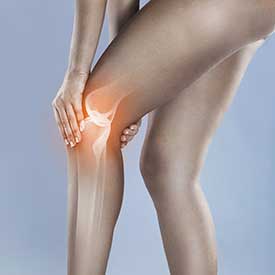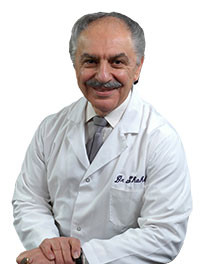Knee Pain Treatment in Hackensack, NJ

Knee pain is a common condition that often results from overuse, injury or medical conditions like arthritis . Due to excessive use, knees are more vulnerable to injury and other medical conditions. The knee joint is supported by various ligaments to enhance its stability. This is necessary because knees are the largest weight-bearing joint in the body.
The most widespread medical condition affecting the knee is arthritis , which causes the gradual deterioration of cartilage. Some knee problems can be treated without surgery, but others may require surgery or full replacement. The most common symptoms of knee-related injuries that cause pain include:
- Deformed or misshapen knee joints.
- Inability to stand or bear weight on the affected leg.
- Inability to straighten or bend the knee.
- Knee that locks or clicks.
- Pain accompanied by tingling, numbness, swelling and discoloration below the knee.
Knee pain can range from mild to severe and can vary from a dull ache to a stabbing, searing pain. It can develop suddenly (acute) or gradually (chronic), and it may be constant or intermittent. Some knee pain worsens with activity and may radiate to other parts of the body. It's important to consult a physician so he or she can evaluate the knee and discuss possible treatment options designed to relieve acute or chronic knee pain.
The Cause of Knee Pain
Medical history, a physical examination and diagnostic tests are all used to help diagnose the underlying cause of knee pain. The physician will gather information about the exact location, onset and severity of the pain. During the physical exam, he or she will evaluate and examine the knee in a number of different positions, checking for swelling, redness and signs of injury. The doctor may also order diagnostic tests - such as an X-ray , MRI or CT scan - to detect fractures, dislocations and any changes in the knee joint caused by arthritis.
Depending on the cause, knee pain may be accompanied by other symptoms, such as inflammation, swelling and stiffness. There are a variety of causes of knee pain, the most common of which includes arthritis and injury. The most common types of knee injuries that cause pain include the following:
- Knee ligament tear: These are common in athletes and usually involve a torn muscle or ligament caused by a sudden stop or change in motion. Injured knee ligaments are graded as grade 1, grade 2 and grade 3 according to the severity of the tear.
- Meniscal tear or ruptured cartilage: These injuries are commonly caused by traumatic injuries in younger patients or are due to degenerative processes in older adults.
- Knee bursitis: People who are constantly on their knees - like plumbers, roofers or athletes - who are prone to direct, hard hits to the knees usually develop this type of inflammation in their knees.
- Patellar tendon tear: This overuse injury is common in people who are active runners - it's also called jumpers knee.
Treatment of Knee Pain
Treatment for knee pain varies and depends on the underlying cause. For knee injuries that are caused by overuse or to treat minor injuries, treatment may be as simple as RICE therapy (rest, ice, compression and elevation). More serious injuries often require medical intervention with an orthopedist. The type of treatment your doctor recommends will depend on several factors, including severity of the injury, activity level and overall health. Many knee injuries can be treated with conservative, non-surgical methods such as:
- Immobilization: The physician may recommend wearing a brace to prevent the knee from moving. For patients who have fractures, a cast or brace will be used to hold the bones in place while they heal.
- Physical therapy: Physicians can reduce knee pain and inflammation using ultrasound, electric stimulation, stretching and manual therapy.
- Prescription medications: Antibiotics may be prescribed for knee infections, and pain relievers may be prescribed for instant pain relief.
- Cortisone shots : These shots can be used to treat some types of knee pain that persist or worsen in spite of other treatments.
More severe knee injuries - such as torn ligaments or cartilage and ruptured tendons - are treated with arthroscopic surgery , also called arthroscopy. During this outpatient procedure, damaged tissue is removed or repaired using surgical instruments inserted through small incisions. Patients who have severe knee damage that does not respond to other treatments may require knee replacement surgery.
Request more information about knee pain treatment today. Call (201) 806-6099 or contact Dr. M.T. Shahab online.
Medwell Orthopedics & Functional Medicine for Men & Women
Address
33 Central AveMidland Park, NJ 07432
(201) 806-6099
www.BergenCountyDoctors.com
Hours
Mon:
8:00 am - 8:00 pm
Tue:
2:00 pm - 7:00 pm
Wed:
8:00 am - 6:30 pm
Thu:
8:00 am - 1:00 pm
Fri:
8:00 am - 6:30 pm
Sat:
9:00 am - 1:00 pm
Sun:
By Appointment Only


